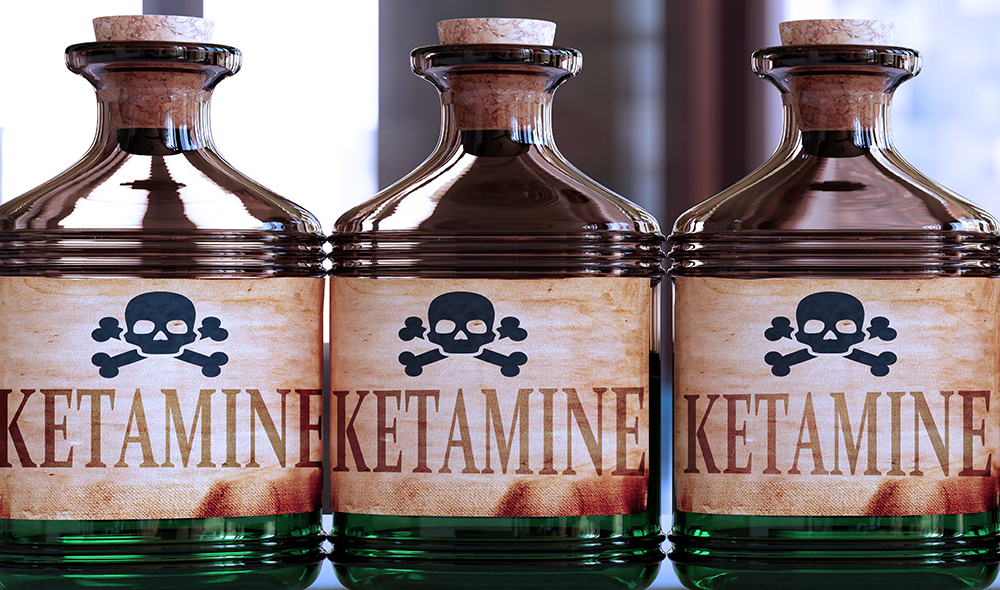CCHR increases its monitoring of FDA approval of nasal spray antidepressant and mental health apps that could increase psychotropic drug use, leading to increased suicide. Latest drug approved is queried over date-rape and suicide allegations.
By CCHR International
The Mental Health Industry Watchdog
August 11, 2020
The Food and Drug Administration (FDA) has approved a variant of the anesthetic and party date-rape drug, ketamine, as a quick-acting antidepressant nasal spray for people with suicidal thoughts. The manufacturer, Janssen Pharmaceuticals has made claims that Spravato (esketamine) can reduce depressive symptoms in as little as four hours.[1] However, esketamine’s listed side effects include increased suicidal thoughts or actions and worsening depression.[2] The FDA is out of control in approving a potential suicide-inducing drug to prevent suicidal ideation.
Citizens Commission on Human Rights is now also monitoring FDA fast tracking approval of mental health devices and apps in the wake of COVID-19, which could lead to increased prescriptions of antidepressants and other psychotropic drugs, with significant risk to Americans. Esketamine’s manufacturer, Janssen’s research and discovery division has partnered with a Singapore-based digital therapeutics company to explore the development of a digital mental health strategy in China.[3] Predictably, this could extend to the U.S., where digital apps can lead to psychotropic drug prescribing.
Janssen said the FDA has approved the supplemental new drug application for adults with major depressive disorder “with acute suicidal ideation or behavior,” while admitting that there is no evidence of effectiveness in preventing suicide or in reducing suicidal ideation or behavior.[4]
An April 2020 article published in Frontiers in Psychiatry on “intranasal esketamine,” proposed the drug be prescribed for suicidal ideation even though the author admitted it “may potentially be associated with the risk of addiction.” The author declared conflicts of interest with the manufacturer of esketamine and four other pharmaceutical companies in the past two years.[5] Another researcher, Dr. Gerard Sanacora, a professor of psychiatry at Yale University was involved in the studies leading to the FDA approval and has consulted for the manufacturer.[6]
Esketamine, like ketamine, can cause changes in blood pressure and heart rate, as well as out-of-body experiences for an hour or so after it is administered.[7] Potential serious risks are because of its molecular similarity to ketamine, a “club” and “date rape” drug that can cause disassociation, meaning victims enter a state in which they feel as if their mind and body aren’t connected.[8] There are reports of it also inducing “psychosis-like” effects.[9] Esketamine is also associated with cognitive performance decline.[10]
COVID-19 is being milked to advocate for more psychiatric funding and treatment, which often translates into more psychotropic drug prescriptions. This inevitably results in mind-altering drugs that numb out the very real emotional problems that come with such devastating situations as being faced now, but it cannot correct the source of these situations. And it’s all done under the guise of a “mental health crisis” or “pandemic fallout.”
This has historically occurred. For example, with the “Spanish” influenza of 1918–19, came with what psychiatrists called a widely recognized psychiatric phenomena: “psychoses of influenza.”[11]
Today, in the wake of current social chaos, psychiatrists have already cited surges in requests for new anti-anxiety prescriptions and longer refills on existing ones.[12] To address what the FDA called “mental health needs” during this chaos, in April, the agency announced it would relax certain premarket requirements for computer programs and mobile apps designed to support treatment of conditions such as depression, anxiety, obsessive compulsive disorder and insomnia. The FDA has also approved the use of prescription apps. CNBC reported the most popular mental wellness apps were downloaded 4 million times in April, up almost 30% since the pandemic began.
It’s a lucrative market. In a recent Nature Digital Medicine study, researchers found 1,435 mental health apps available in the app stores.[13] The global mental health apps market is expected to reach $3.9 billion by 2027.[14]
Add to that Medicare has lifted restrictions on telepsychiatry to enable delivery of “mental health services” without the need for office visits. There is a general lift of restrictions and loosening of regulations in the mental health industry that opens the door to fraud and abuse, especially when increasing prescriptions for antidepressants and, now nasal spray antidepressants. This takes advantage of people naturally stressed and anxious about mandated regulations and economic survival right now. The global telepsychiatry market is also a financial goldmine, expected to reach $36.3 billion by 2027.[15]
The psychiatric-pharmaceutical industry is profiting from the current crises and without accountability for its past failures. CCHR says greater monitoring is needed to evaluate links between a less regulated industry, increased psychiatric drug apps influencing prescription increases and potential concomitant rise in suicide.
References:
[1] https://www.prnewswire.com/news-releases/janssen-announces-us-fda-approval-of-spravato-esketamine-ciii-nasal-spray-to-treat-depressive-symptoms-in-adults-with-major-depressive-disorder-with-acute-suicidal-ideation-or-behavior-301104437.html; “Johnson & Johnson antidepressant spray approved for treating those at risk of suicide,” Fortune, 3 Aug. 2020, https://fortune.com/2020/08/03/johnson-johnson-spray-suicide-treatment/; “Nasal Spray Is A New Antidepressant Option For People At High Risk of Suicide,” NPR, 7 Aug. 2020, https://www.npr.org/sections/health-shots/2020/08/07/900272454/nasal-spray-is-a-new-antidepressant-option-for-people-at-high-risk-of-suicide; https://www.gov1.com/public-safety/articles/what-to-know-about-ketamine-a-common-date-rape-drug-8DxnS7OteEhx7UmX/
[2] https://www.medicinenet.com/esketamine_spravato/article.htm#what_are_
the_side_effects_of_esketamine_spravato
[3] “Holmusk and Janssen R & D partner to develop digital mental health strategy in China,” mobihealthnews.com, 20 June 2019, https://www.mobihealthnews.com/content/asia-pacific/holmusk-and-janssen-r-d-partner-develop-digital-mental-health-strategy-china
[4] https://www.prnewswire.com/news-releases/janssen-announces-us-fda-approval-of-spravato-esketamine-ciii-nasal-spray-to-treat-depressive-symptoms-in-adults-with-major-depressive-disorder-with-acute-suicidal-ideation-or-behavior-301104437.html
[5] https://www.ncbi.nlm.nih.gov/pmc/articles/PMC7203410/
[6] “Nasal Spray Is A New Antidepressant Option For People At High Risk of Suicide,” NPR, 7 Aug. 2020, https://www.npr.org/sections/health-shots/2020/08/07/900272454/nasal-spray-is-a-new-antidepressant-option-for-people-at-high-risk-of-suicide
[7] “Nasal Spray Is A New Antidepressant Option For People At High Risk of Suicide,” NPR, 7 Aug. 2020, https://www.npr.org/sections/health-shots/2020/08/07/900272454/nasal-spray-is-a-new-antidepressant-option-for-people-at-high-risk-of-suicide
[8] https://www.medicalnewstoday.com/articles/320409.php; https://www.bloomberg.com/news/features/2019-02-05/ketamine-could-soon-be-used-to-treat-suicidal-ideation; https://rxisk.org/bait-and-switch-the-great-ketamine-breakthrough/
[9] https://www.ucl.ac.uk/news/2009/nov/heavy-ketamine-use-affects-short-term-memory
[10] Randall L. Morrison, et al., “Effect of intranasal esketamine on cognitive functioning in healthy participants: a randomized, double-blind, placebo-controlled study,” Psychopharmacology (Berl). 2018; 235(4), 1107-1119, https://www.ncbi.nlm.nih.gov/pmc/articles/PMC5869899/
[11] https://www.ncbi.nlm.nih.gov/pmc/articles/PMC7054463/
[12] Nick Brown, “CORRECTED-As coronavirus takes emotional toll, mental health professionals brace for spike in demand,” Reuters, 20 March 2020, https://ca.reuters.com/article/idUSXXN2BC01G
[13] “Holmusk and Janssen R & D partner to develop digital mental health strategy in China,” mobihealthnews.com, 20 June 2019, https://www.mobihealthnews.com/content/asia-pacific/holmusk-and-janssen-r-d-partner-develop-digital-mental-health-strategy-china
[14] https://www.prnewswire.com/news-releases/mental-health-apps-market-accounted-for-us-587-9-mn-in-2018-and-is-expected-to-generate-a-revenue-of-us-3-918-40-mn-by-2027–at-a-growth-rate-of-23-7-from-2019–2027–300997559.html
[15] https://www.prnewswire.com/news-releases/telepsychiatry-market-size-worth-36-3-billion-by-2027–cagr-24-7-grand-view-research-inc-301096750.html


